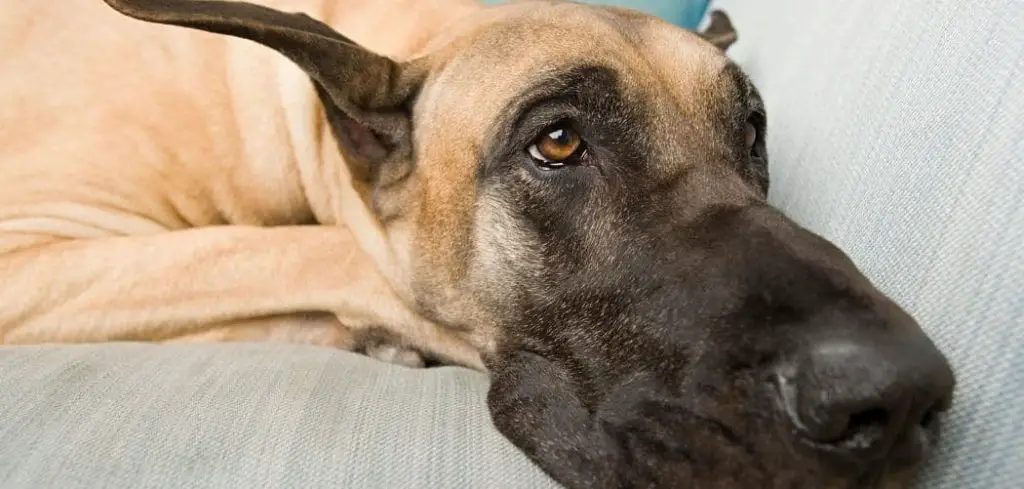When an old dog is not eating and vomiting yellow, it’s a concerning sign that their digestive system or overall health may be compromised.
Yellow vomit, often bile, can indicate stomach irritation, illness, or more serious underlying conditions.
We outline the common reasons why an old dog may not be eating and vomiting yellow vomit, what you can do at home, and when to seek veterinary help.
Old Dog Not Eating and Vomiting Yellow Vomit — Why It Happens
An old dog not eating and vomiting yellow vomit usually signals that the stomach is empty, inflamed, or irritated. Common causes in senior dogs include bile reflux, gastritis, pancreatitis, liver or kidney disease, and occasionally blockages.
Older dogs are less resilient, so even occasional vomiting can lead to dehydration, weakness, and rapid health decline.

Old Dog Not Eating and Vomiting Yellow Vomit: Common Causes
Bile Reflux
Bile reflux occurs when bile from the small intestine flows backward into the stomach, irritating the lining.
Older dogs that skip meals or eat small amounts may experience this more frequently. Vomiting yellow bile often happens in the morning or after periods without food.
Frequent bile vomiting can damage the stomach lining, lead to weight loss, and reduce nutrient absorption, especially concerning in seniors.
Read more: Old Dog Not Eating and Throwing Up Water (Why it happens)
Gastritis
Gastritis, inflammation of the stomach lining, can be caused by dietary indiscretion, infection, or medications.
Dogs may vomit yellow bile due to an empty stomach and feel nauseated, which discourages eating. Symptoms may include drooling, lip licking, or discomfort after meals.
Untreated gastritis can lead to ulcers, dehydration, and malnutrition, particularly in older dogs who cannot tolerate prolonged digestive upset.
Pancreatitis
Pancreatitis is inflammation of the pancreas, often triggered by high-fat meals but sometimes occurring spontaneously in seniors.
This condition irritates the stomach and intestines, causing vomiting (often yellow bile), abdominal pain, and appetite loss.
Pancreatitis can escalate quickly to dehydration, systemic illness, and organ failure in older dogs, making veterinary care urgent.
Liver Disease
Liver dysfunction in senior dogs can lead to bile accumulation, nausea, and vomiting yellow fluid.
Signs often include jaundice (yellowing of eyes or gums), weight loss, lethargy, and poor appetite.
Because the liver influences many bodily functions, even mild vomiting in seniors can be a red flag for serious underlying disease.
Kidney Failure
Kidney disease leads to toxin buildup in the bloodstream, causing nausea and vomiting.
Older dogs with kidney issues may vomit yellow bile when the stomach is empty, in addition to drinking less or urinating more frequently. Other signs can include bad breath, lethargy, and weight loss.
Prompt veterinary care is essential to manage kidney disease and prevent rapid deterioration.
Intestinal Blockage
A blockage caused by ingested objects, tumors, or severe constipation can prevent food from moving through the digestive tract.
This often results in vomiting of yellow fluid, as only bile and stomach secretions can escape. Dogs may appear restless, strain during elimination, or show abdominal swelling.
Blockages in older dogs are emergencies, as they can quickly progress to tissue death and shock.
What to Do If Your Old Dog Is Not Eating and Vomiting Yellow Vomit
Offer small, bland meals like boiled chicken and rice, especially if vomiting occurs when the stomach is empty. Feeding smaller portions more frequently can help prevent bile reflux.
Ensure constant access to fresh water. Older dogs dehydrate quickly after vomiting. You can also offer ice cubes or low-sodium broth to encourage fluids.
Keep your dog calm and rested to minimize nausea and digestive stress. Warming food slightly or switching to wet food may increase appetite.
Avoid giving medications like Pepto-Bismol without veterinary guidance, as some drugs can worsen vomiting or mask symptoms.
When to Call or Visit Your Vet
Seek veterinary care if vomiting occurs more than once in 24 hours, or if your dog refuses all food and water.
Immediate attention is required if vomiting is accompanied by blood, extreme lethargy, abdominal pain, or signs of dehydration.
Chronic bile vomiting or persistent appetite loss in older dogs may indicate liver disease, pancreatitis, or intestinal blockage, all of which require professional diagnosis and treatment.
Read more: Old Dog Not Eating (Causes and what to do)
Key Takeaway
When an old dog is not eating and vomiting yellow, it signals that the digestive system or internal organs may be compromised. Causes can range from bile reflux and gastritis to pancreatitis, liver, or kidney disease.
At home, you can provide small, bland meals, ensure hydration, and keep your dog calm, but persistent vomiting always warrants veterinary evaluation.
Prompt action helps prevent dehydration, malnutrition, and complications, ensuring your senior dog remains as comfortable and healthy as possible.
